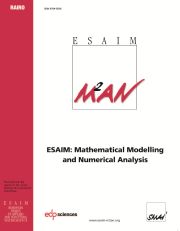Crossref Citations
This article has been cited by the following publications. This list is generated based on data provided by
Crossref.
Chen, Yanlai
Hesthaven, Jan S.
Maday, Yvon
Rodríguez, Jerónimo
and
Zhu, Xueyu
2012.
Certified reduced basis method for electromagnetic scattering and radar cross section estimation.
Computer Methods in Applied Mechanics and Engineering,
Vol. 233-236,
Issue. ,
p.
92.
Gerner, Anna-Lena
and
Veroy, Karen
2012.
Certified Reduced Basis Methods for Parametrized Saddle Point Problems.
SIAM Journal on Scientific Computing,
Vol. 34,
Issue. 5,
p.
A2812.
Abdulle, Assyr
and
Bai, Yun
2012.
Reduced basis finite element heterogeneous multiscale method for high-order discretizations of elliptic homogenization problems.
Journal of Computational Physics,
Vol. 231,
Issue. 21,
p.
7014.
Boyaval, Sébastien
2012.
A fast Monte–Carlo method with a reduced basis of control variates applied to uncertainty propagation and Bayesian estimation.
Computer Methods in Applied Mechanics and Engineering,
Vol. 241-244,
Issue. ,
p.
190.
Haasdonk, B.
Salomon, J.
and
Wohlmuth, B.
2012.
A Reduced Basis Method for Parametrized Variational Inequalities.
SIAM Journal on Numerical Analysis,
Vol. 50,
Issue. 5,
p.
2656.
Lassila, Toni
Manzoni, Andrea
Quarteroni, Alfio
and
Rozza, Gianluigi
2013.
Analysis and Numerics of Partial Differential Equations.
Vol. 4,
Issue. ,
p.
307.
DeVore, Ronald
Petrova, Guergana
and
Wojtaszczyk, Przemyslaw
2013.
Greedy Algorithms for Reduced Bases in Banach Spaces.
Constructive Approximation,
Vol. 37,
Issue. 3,
p.
455.
Chen, Peng
Quarteroni, Alfio
and
Rozza, Gianluigi
2013.
A Weighted Reduced Basis Method for Elliptic Partial Differential Equations with Random Input Data.
SIAM Journal on Numerical Analysis,
Vol. 51,
Issue. 6,
p.
3163.
Heyberger, Ch.
Boucard, P.-A.
and
Néron, D.
2013.
A rational strategy for the resolution of parametrized problems in the PGD framework.
Computer Methods in Applied Mechanics and Engineering,
Vol. 259,
Issue. ,
p.
40.
Ai, Hong
2013.
Large-scale network security situational awareness based on association rule research.
p.
767.
Chen, Yanlai
and
Gottlieb, Sigal
2013.
Reduced Collocation Methods: Reduced Basis Methods in the Collocation Framework.
Journal of Scientific Computing,
Vol. 55,
Issue. 3,
p.
718.
Chapelle, D.
Gariah, A.
Moireau, P.
and
Sainte-Marie, J.
2013.
A Galerkin strategy with Proper Orthogonal Decomposition for parameter-dependent problems – Analysis, assessments and applications to parameter estimation.
ESAIM: Mathematical Modelling and Numerical Analysis,
Vol. 47,
Issue. 6,
p.
1821.
Bíró, David A. Lowther and Piergiorgio Alotto, Oszkár
Sommer, Alexander
Farle, Ortwin
and
Dyczij-Edlinger, Romanus
2013.
Efficient finite-element computation of far-fields of phased arrays by order reduction.
COMPEL: The International Journal for Computation and Mathematics in Electrical and Electronic Engineering,
Vol. 32,
Issue. 5,
p.
1721.
Abdulle, Assyr
and
Bai, Yun
2013.
Adaptive reduced basis finite element heterogeneous multiscale method.
Computer Methods in Applied Mechanics and Engineering,
Vol. 257,
Issue. ,
p.
203.
Chkifa, Abdellah
Cohen, Albert
DeVore, Ronald
and
Schwab, Christoph
2013.
Sparse adaptive Taylor approximation algorithms for parametric and stochastic elliptic PDEs.
ESAIM: Mathematical Modelling and Numerical Analysis,
Vol. 47,
Issue. 1,
p.
253.
Haasdonk, B.
Salomon, J.
and
Wohlmuth, B.
2013.
Numerical Mathematics and Advanced Applications 2011.
p.
821.
Druskin, V.
Simoncini, V.
and
Zaslavsky, M.
2014.
Adaptive Tangential Interpolation in Rational Krylov Subspaces for MIMO Dynamical Systems.
SIAM Journal on Matrix Analysis and Applications,
Vol. 35,
Issue. 2,
p.
476.
Giraldi, Loïc
Litvinenko, Alexander
Liu, Dishi
Matthies, Hermann G.
and
Nouy, Anthony
2014.
To Be or Not to Be Intrusive? The Solution of Parametric and Stochastic Equations---the “Plain Vanilla” Galerkin Case.
SIAM Journal on Scientific Computing,
Vol. 36,
Issue. 6,
p.
A2720.
Tamellini, L.
Le Maître, O.
and
Nouy, A.
2014.
Model Reduction Based on Proper Generalized Decomposition for the Stochastic Steady Incompressible Navier--Stokes Equations.
SIAM Journal on Scientific Computing,
Vol. 36,
Issue. 3,
p.
A1089.
Ohlberger, Mario
and
Smetana, Kathrin
2014.
A Dimensional Reduction Approach Based on the Application of Reduced Basis Methods in the Framework of Hierarchical Model Reduction.
SIAM Journal on Scientific Computing,
Vol. 36,
Issue. 2,
p.
A714.




